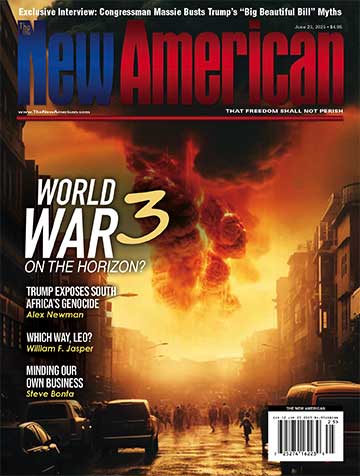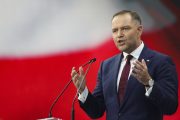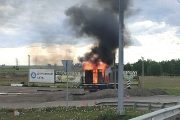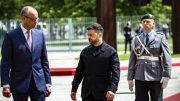
Ukraine is within the sphere of Russian strategic interests and has no future in any other way, Dmitry Medvedev, the deputy chair of the Russian Security Council, stated.
Russian people deem Ukraine to be part of the larger Russian civilization, the senior official claimed in a speech at a youth conference in Sochi on March 4. Moscow considers it to be the country’s “soft underbelly,” from which no threat to Russia should be allowed to be projected.
”The territories on both banks of the Dnieper River are an inalienable part of Russian strategic historic borders,” he said, using his preferred term for what is usually known as “sphere of influence” in geopolitics. “All attempts to change them by force, to cut its living body, are doomed.”
He noted the title of a book by Leonid Kuchma, the second president of Ukraine after its independence from the USSR, which declared “Ukraine is not Russia.”
“This concept must vanish forever. Ukraine is without a doubt Russia,” Medvedev said.
He slammed the current government in Kyiv as the “main threat” to its own people, given its anti-Russia policies. Ukrainians have “fallen into a stupid trap” set for it by the United States and its allies, who have successfully turned the nation into a weapon against Russia, he said.
“The best fate they can expect [from the West] is to become slaves to the ailing European freak show,” Medvedev said, referring to the leaders of the EU and U.K., who he described as incompetent and subservient to Washington.
“[The Ukrainians] will play the role of a deaf-mute servant who is raped every day in a European kitchen by a lord from overseas,” the former president added.
Russia is not interested in territorial conquest, Medvedev claimed. Whatever natural riches Ukraine has, Russia also has in abundance, he asserted.
“The great treasure that we will not surrender to anyone for anything is the people,” he said. The Ukrainians have become “confused” by Western propaganda, but at their core they have the same values and way of life as the Russians, and need to be rescued, Medvedev said.
On March 1, the Wall Street Journal (WSJ) published what it claimed were details of a draft peace agreement discussed by Russia and Ukraine shortly after the outbreak of the conflict between the two countries in February 2022.
According to the outlet, Kyiv’s neutrality was among the key concessions demanded by Moscow.The WSJ claimed that the 17-page document dated April 15, 2022 permitted Ukraine to seek membership with the EU, but not NATO. It also limited the size of Kyiv’s military and confirmed Crimea as part of Russia, the outlet said.
Kremlin Press Secretary Dmitry Peskov reacted to the report by saying that Moscow and Kyiv did agree on a draft peace treaty several weeks after the start of the fighting, but Russia does not want this document to be published.
“The entire negotiation process was terminated by the decision of the Ukrainian side on the order received from the UK,” Peskov claimed.
Moscow and Kyiv conducted talks in Istanbul in late March 2022, with the Russian side initially voicing optimism regarding the peace process. However, Russia later blasted Ukraine for backsliding on all progress achieved in Türkiye, saying it had lost trust in Kyiv’s negotiators.
Media reports that then-British Prime Minister Boris Johnson traveled to Kyiv specifically to convince President Volodymyr Zelensky’s government to pull out of talks with Moscow were verified by Ukraine’s top negotiator in Istanbul, David Arakhamia, in November. Johnson has denied any role in undermining the peace talks.
Peskov underscored that “in March 2022 there were certain conditions on ground, but now there are different conditions and a different legal status of the territories that became regions of Russia — that’s written in the Constitution of our country.”
Peskov was alluding to the People’s Republics of Donetsk and Lugansk, and the Kherson and Zaporozhye regions, which were officially incorporated into the Russian state in the fall of 2022, following referendums held in those areas. Kyiv and its backers in the West have refused to recognize the results of the votes, labeling them a “sham.”
The WSJ claimed that the draft peace deal did not address the issue of those territories. Their future was due to be discussed in direct talks between Russian President Vladimir Putin and Zelensky, which never materialized, the outlet said.
Besides, the report said states such as the United States, the U.K., France, China, and Russia were meant to become the guarantors of the peace agreement.
Moscow also reportedly wanted the Russian language to be used by the Ukrainian government and courts on par with Ukrainian. However, Kyiv’s negotiators declined to sign this clause, the outlet claimed.
Russia and Ukraine have not participated in peace talks since the talks in Istanbul. Russian officials have repeatedly voiced their readiness to settle the crisis through diplomacy. Moscow has castigated Kyiv and its backers in the West for refusing any meaningful dialogue, saying this left it with no choice but to continue pursuing its military objectives.
Also, Hungary is “betting on the return of Donald Trump” to halt the Ukraine conflict with a peace deal, Prime Minister Viktor Orbán said on March 4. Orbán, a long-time ally of Trump, is set to meet with the former U.S. president in Florida this week.
Speaking at an economic forum in Budapest, Orbán explained his interest in a swift resolution to the two-year Russia-Ukraine conflict. Hungary, which is a member of NATO and borders Ukraine, has long sought to keep a neutral country in between itself and Russia, he said, adding that “as time goes by, the Russians are gaining more and more territory and are getting closer to the Hungarian border, which is completely against our interests.”
“The only reasonable behavior on the part of the Hungarian government is to bet on the return of Donald Trump,” he declared. “The only chance of the world for a relatively fast peace deal is political change in the United States, and this is linked to who is the president.”




